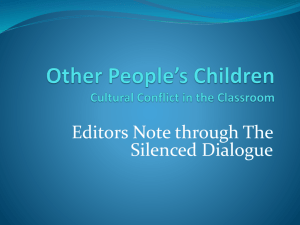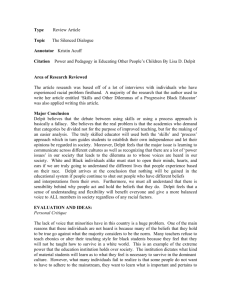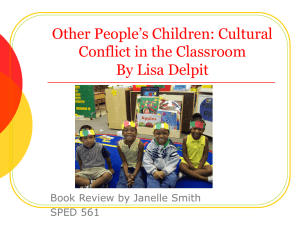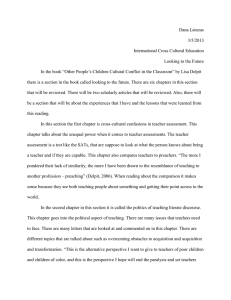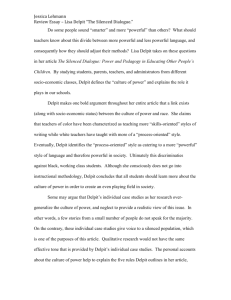Essential ways to educate different culture
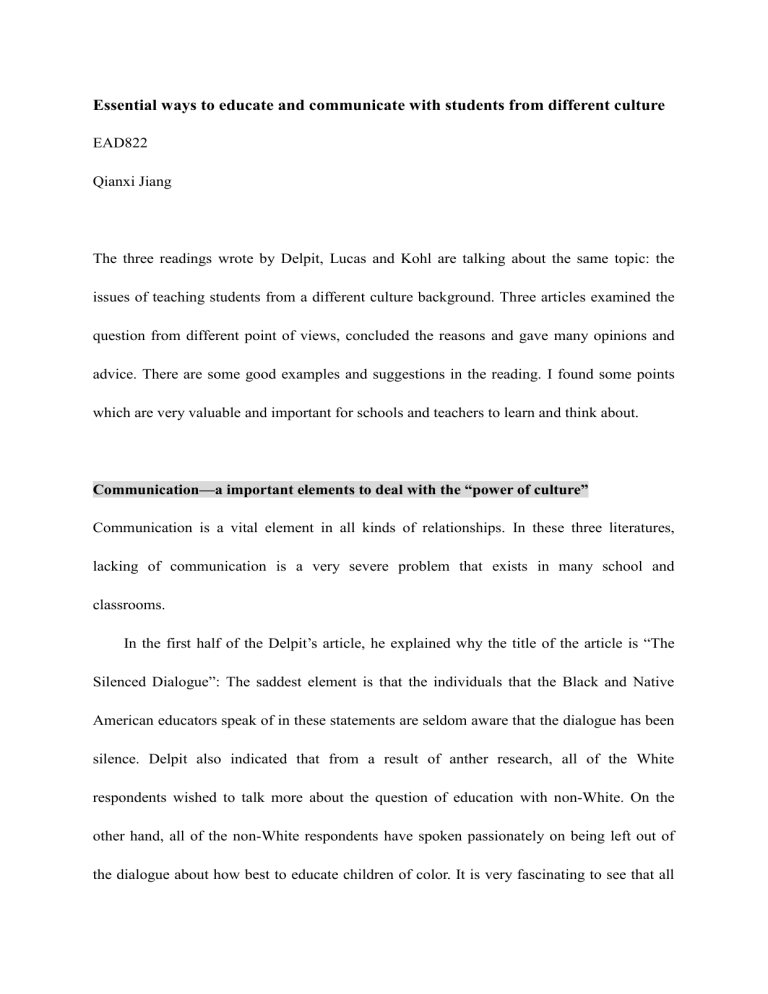
Essential ways to educate and communicate with students from different culture
EAD822
Qianxi Jiang
The three readings wrote by Delpit, Lucas and Kohl are talking about the same topic: the issues of teaching students from a different culture background. Three articles examined the question from different point of views, concluded the reasons and gave many opinions and advice. There are some good examples and suggestions in the reading. I found some points which are very valuable and important for schools and teachers to learn and think about.
Communication—a important elements to deal with the “power of culture”
Communication is a vital element in all kinds of relationships. In these three literatures, lacking of communication is a very severe problem that exists in many school and classrooms.
In the first half of the Delpit’s article, he explained why the title of the article is “The
Silenced Dialogue”: The saddest element is that the individuals that the Black and Native
American educators speak of in these statements are seldom aware that the dialogue has been silence. Delpit also indicated that from a result of anther research, all of the White respondents wished to talk more about the question of education with non-White. On the other hand, all of the non-White respondents have spoken passionately on being left out of the dialogue about how best to educate children of color. It is very fascinating to see that all
the people are willing to have more communication, but they couldn’t find a better way to communicate with each other. For this problem, the author recommended that the method to deal with this problem is to identify and give voice to alternative world views.
Delpit indicated a theme which I think is fascinating: “the culture of power”. Every culture has its own codes or rules. To those people who just get into the culture, he or she will under the power of the culture automatically. I do not say that it is a bad thing but I do want to ask: is it fair for them? From the example she gave in the article, the Indian interviewee could not give the interviewer an acceptable answer because of the culture difference. To make this problem even worse, the interviewer did not want to acknowledge themselves as having power over the applicant. There is no possibility for the Indian interviewee to win this job. For education, how do students who from another culture survive under the power of
American culture? In the Lucas’s article, she gave us six good examples of high schools which promoting the education of language-minority student successfully. In all the reasons that she concluded, communication is expected in a high level. There are so many relationships in the school. The power of culture is also mentioned in the Kohl’s book. “Since students have no way to legitimately criticize the schooling they are subjected to or the people they are required to learn from, resistance and rebellion is stigmatized. The system's problem becomes the victim's problem.” To promote a better educational environment for language minority students, it requires a high level of communication which is not only between the teacher and the student, but also between the family and the school and among the school staff members.
The way to teach should change from Problem-solving to problem-preventing and it is also needs to based on the student’s needs
In the Lucas article, she and two other researchers report on an exploratory study of six secondary schools which successfully provided the language-minority students a good educational environment in California and Arizona, and describe the key features they found to be integral to these schools’ success. Compared to the other two articles which are problem-solving oriented, the Lucas article focus on the problem-preventing style which I believe is more efficient and powerful to deal with the problem of teaching students from a different culture background. In the Lucas’s article, I think the eight key features that promote the success of language-minority students are very useful. These eight features can be thought of as a set of general recommendations, or perhaps as a checklist against which to compare other schools or programs. This is much better than fix the students’ problems of “I won’t learn from you”.
Also, all the articles talked about setting up goals based on the students’ needs, which is why Kohl heavily believed in the values and methods of maladjustment, once he was introduced to strategy? Especially in our curriculum today, majority of the teachers don't make it a point to adjust the curriculum to the students needs and value the students input, effort or creativity that he or she may display within the classroom setting. The individuals capabilities are undermined and are generally are much higher than what they are perceived to be. In result, the individual begins to think the same way that he or she is defined and perceived, which is beneficial for some but doesn't apply to every individual.
Based on the respect for different culture, teaching student’s hope and love is needed
Respect is the foundation of good relationships. It is reflected in many ways.
For example, In the Lucas’s article, she mentioned that: we believe that the most critical element in determining whether educators can work toward success for all students is the belief that all students can succeed. Here, respect is to have faith for students. It remembers me the video of the little black boy’s speech. “Do you believe in me?” “Because here’s the deal: I can do anything, be anything, create anything, dream anything, and become anything – because you believe in me.” The amazing part of his idea is he asked everyone to believe their colleagues and themselves. It is not only about teaching students the skills and the knowledge; it is also about teaching love and hope.
In the book I won’t learn from you , Herbert Kohl's purpose of this book was to define what ''not learning'' is. Moreover, I think the big idea about this book is to teach students love and hope. Not learning is totally different than failure to learn. It is more like that the students do not want to learn from the class or the teacher because they lost their hope and faith to successes. I think Kohl’s book is really a good reminder.
Another way to show the respect is to value different opinions. It is also the base of good communication. To better deal with the problem showed in the Delpit’s article. I think it is not enough to only make people from different backgrounds learn the new culture; it is also very important that the culture itself needs to respect other cultures.
Reference:
1.
Delpit, Lisa D., The Silenced Dialogue: Power and Pedagogy in Educating Other
People's Children. Harvard Educational Review, v58 n3 p280-98 Aug 1988
2.
Lucas, Tamara and Others, Promoting the Success of Latino Language-Minority
Students: An Exploratory Study of High Schools, Harvard Educational Review, v60 n3 p315-40 Aug 1990
3.
Herbert Kohl, I won’t learn from you, New Press, July 1995

